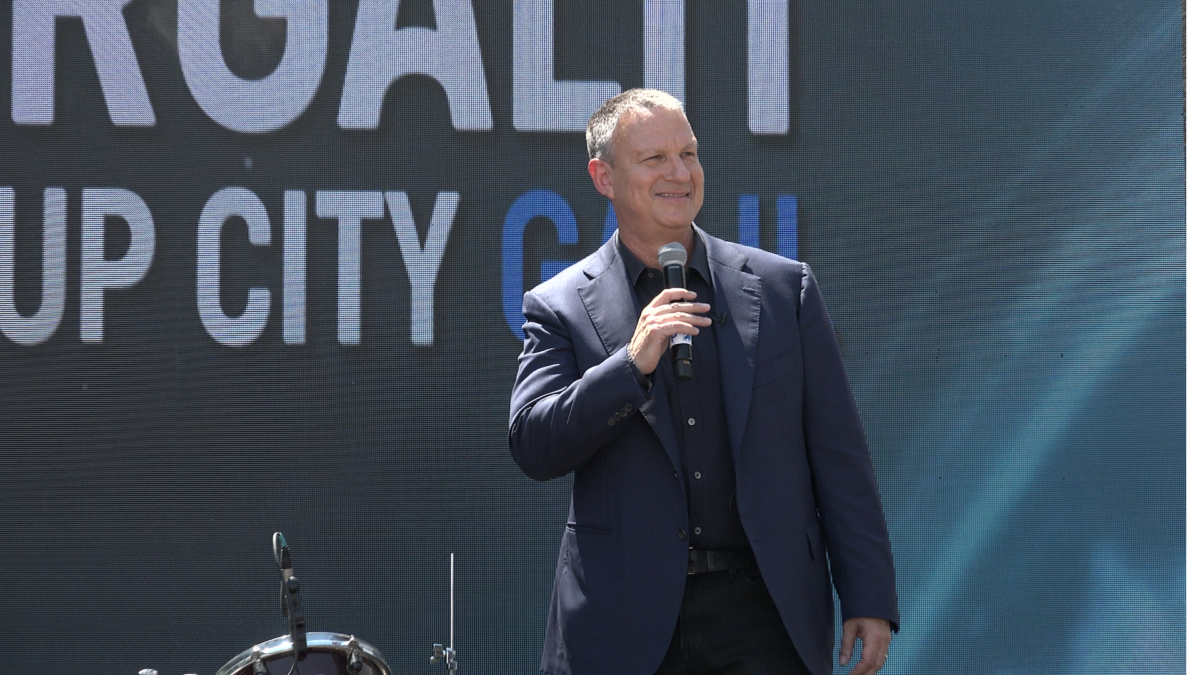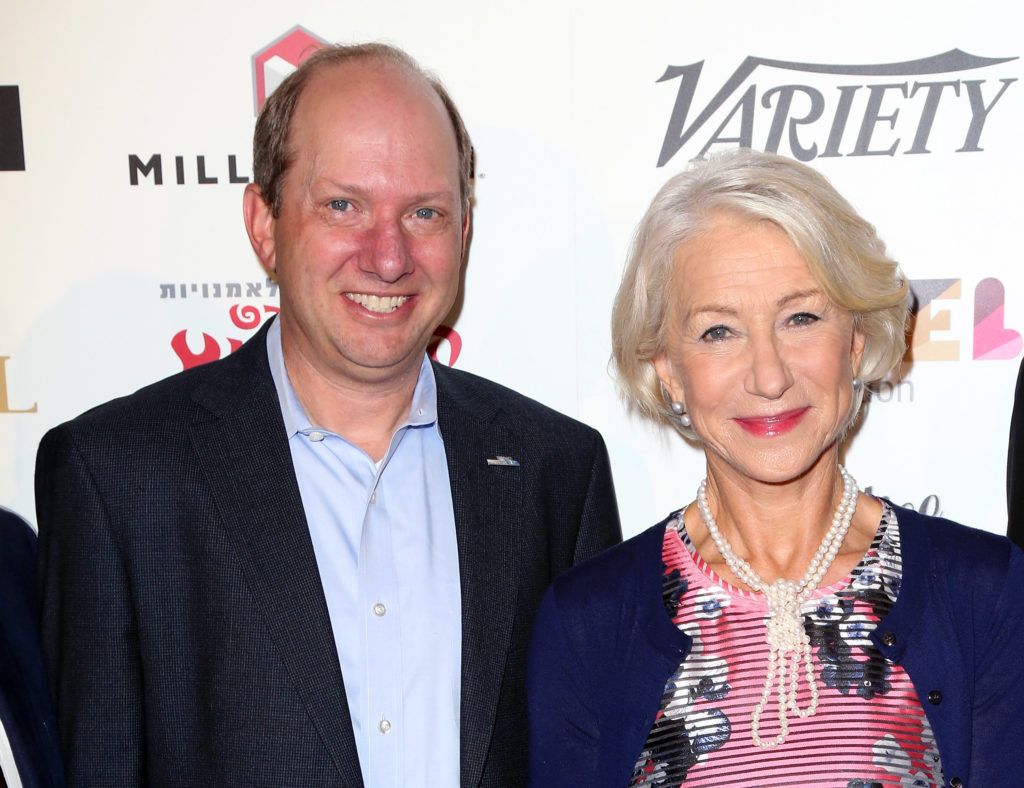Your Daily Phil: The Jewish debate over MacKenzie Scott’s giving
Good Friday morning!
Tomorrow marks the 20th anniversary of the 9/11 attacks. Organizations across the U.S. are planning commemorative events, including at the 9/11 memorial in Lower Manhattan, where President Joe Biden and other dignitaries will attend.
The Global Innovation Challenge (GIC), a new contest sponsored by Tikkun Olam Makers (TOM) to create solutions for the obstacles faced by people with disabilities, has attracted 250 entrants from 55 teams, Gidi Grinstein, TOM’s founder and president, told eJewishPhilanthropy. In the past, the organization had helped sponsor local “makeathon” to devise such solutions.
“The GIC is already three times bigger than our largest makeathon to date. We are blown away by the willingness of highly skilled people from all over the world to collaborate in solving acute social problems,” Grinstein said.
The participants, from countries such as Ethiopia, Serbia and the U.K., are mainly engineers, product designers, students and people who are trying to help a family member with a disability. The ideas submitted to TOM include an automatic trouser-dressing machine for an adult with no upper-body mobility; a video game controller for a teenager who lacks fine motor skills; and a hybrid electro-mechanical hand prosthesis for a person with no fingers.
The competition will run until Oct. 24, and will culminate in a closing event in the U.S. Pavilion at the Dubai Expo 2020 in November.
TRENDS IN GRANTMAKING
Jewish philanthropists debate MacKenzie Scott’s giving strategy


HIAS
MacKenzie Scott has given away $8.5 billion in less than a year, spurring a conversation among Jewish grant-makers about her untraditional philanthropic methods, according to a range of experts, observers, donors and communal professionals who described the debate for eJewishPhilanthropy’s Helen Chernikoff.
Growing influence: Jeannie Infante Sager, director of the women’s philanthropy institute at Indiana University’s Lilly Family School of Philanthropy, said the charitable advisors in her network are increasingly hearing from clients who are intrigued by what Scott is doing by emphasizing unsolicited, unrestricted, multi-year grants. Academics can’t yet quantify Scott’s influence because her giving, while momentous, is still new, said Sager. Similarly, Scott’s donations are being invoked in the Jewish world, where two organizations — HIAS, the refugee support and advocacy group, and Repair the World, a service corps for young people — received grants from her.
Power dynamics: “We’re hearing her name being mentioned as an example,” said Rabbi Rebecca Sirbu, executive vice president of the Jewish Funders Network (JFN), a service organization that is open to donors who give a minimum of $25,000 annually in the name of Jewish values. Scott’s philanthropic style, which Sager called “trust-based philanthropy,” dovetails neatly with “GrantED,” an initiative of JFN’s and Upstart that aims to strengthen relationships between grant makers and grantees. GrantED fosters conversations about power dynamics between donors and recipients and educates funders about the need for unrestricted grants that aren’t tied to any one specific program and can be used for general operating support, Sirbu said.
Big ambitions: “Racial justice. Educational access. These are big issues Scott’s investing in,” Sirbu said. “She’s inspiring donors to think more about long-term impact.” Unrestricted giving is already a Jewish philanthropic practice, said Eric Goldstein, CEO of UJA-Federation of New York, but he would like to see it become more widespread. The federation makes about 80 such grants a year, amounting to $65 million to $70 million, to partners such as JCCs, Hillel chapters and camps. Those allocations can amount to half of the federation’s annual giving. “I think what she’s doing is very helpful. Unrestricted, long-term support is the lifeblood of many organizations,” Goldstein said, noting that such funds mitigate the financial uncertainty of grants that need frequent reauthorization.
THE ECONOMICS OF JEWISH LIFE
Jews and money: Living our values


iStock
“When I was a young rabbinical student around 1993, I visited the childhood home of a woman I was dating. She was from a strong and proud Jewish family, and her parents were intrigued that their daughter was dating a future rabbi. It was not your typical ‘meet the parents’ scene. Her mother did not want to know what my plans were for their daughter; she wanted to know what I thought the future held for American Jewry!” writes Rabbi Jay Moses of The Wexner Foundation, in an opinion piece for eJewishPhilanthropy.
Wisdom of the young: “Caught off-guard, and not sure that as a 24-year-old graduate student I was in a position to opine authoritatively about the Jewish future, I tossed out the first coherent thought I could generate: ‘I think the Jewish community of the future will be smaller and also more intensely Jewish.’”
Economics of Jewish life: “I believe that prediction is on its way to coming true. There are many factors that influence the size, scope, makeup and overall health of our Jewish community. But the economics of Jewish life undoubtedly constitute a significant part of it. The relatively small, intensely committed core of the Jewish community has gotten stronger and more deeply committed, and that core is willing to expend ever-greater resources on accessing Jewish life. The rest of the Jewish community experiences cost as yet another barrier to Jewish life (on a long and growing list).”
EXPECTATIONS
The conundrum of supplementary schools


iStock
“Helen Chernikoff’s recent piece on ‘Hebrew School 101’ dealing with the history and future of supplementary Jewish education rang a bell with me (no pun intended) as I am a product of that system, albeit from almost 70 years ago,” writes Sherwin Pomerantz, immediate past chair of the Pardes Institute of Jewish Studies, in an opinion piece for eJewishPhilanthropy.
Analysis: “To be sure, there is no question that supplementary schools are limited in what they can teach and at what depth. When I was president of the Board of Jewish Education of Metropolitan Chicago in the early ‘80s we looked at this challenge very carefully. Analysis at the time clearly demonstrated that five years of supplemental education was barely equivalent, in terms of teaching hours, to one year of day school education. For the one-day-a-week schools, or ‘Sunday Schools’ as they were called at the time, the numbers were even worse.”
Expectations: “In retrospect, where most of the supplemental schools failed was in not having a specific achievable objective that informed their instruction. Too many of these institutions, lacking specific objectives, permitted the parents to have expectations that simply could not then, and still cannot, be realized in a few hours a week of after-school education.”
Worthy Reads
New Applications: In the Chronicle of Philanthropy, Eden Stiffman explains why philanthropists need to better understand the rising phenomenon of donors who give directly to individuals in need instead of through a nonprofit. While this is the oldest form of generosity, crowdfunding platforms and other technologies have raised the profile of direct giving and made it easier to do. “By continuing to ignore it, the nonprofit sector becomes more and more isolated from the many choices people are making,” said Lucy Bernholz, director of Stanford University’s Digital Civil Society Lab and author of the forthcoming book How We Give Now. [ChroniclePhilanthropy]
Taking Time: Nonprofit professionals who feel that their organization would benefit from sabbaticals should understand that they have the power to implement such a program, writes Nell Edington in Social Velocity. The notion that donor permission is required to make such a change is an indication of a dysfunctional power dynamic, according to Edington. Nonprofit leaders, like any human being, need large chunks of time away to rest, recharge, find inspiration again, and reconnect to what makes them human, not machine,” Edington concludes. [SocialVelocity]
Baby Steps: Funders and nonprofits need to be careful not to become so excited about promising new work that they attempt to grow too quickly, suggest Aneesha Capur, John Newsome and Igor Rubinov in Stanford Social Innovation Review. Organizations are unlikely to be able to refine their models and grow them simultaneously. “Efficacy requires demonstrating compelling and replicable results, as well as codifying what works: specific programmatic and staffing requirements, program frequency, dosage, duration,” the authors conclude. [SSIR]
Community Comms
Be featured: Email us to inform the eJP readership of your upcoming event, job opening, or other communication.
Word on the Street
The Jewish Community Foundation of Los Angeles awarded $3.7 million in grants to 45 local organizations, including 22 Jewish nonprofits and 23 synagogues, as they recover from the pandemic. This represents both the largest amount and the greatest number of recipients ever awarded by the foundation in a single grants cycle… Stefan Oscar, a veteran JDC senior program professional, has been named executive director of JDC’s Former Soviet Union unit… Leichtag Foundation’s Coastal Roots Farm is holding its annual Sukkot Harvest Festival next week… Israeli businessman Moshe Hogeg is selling the Israeli soccer team Beitar Jerusalem after three years as owner that saw him confront an anti-Arab fanbase… Cambridge Trust committed $110 million over 10 years to a loan pool to help finance construction of affordable housing in Massachusetts… A new report from the Global Fund to Fight AIDS, Tuberculosis and Malaria finds the COVID-19 pandemic had a devastating impact on the fight against HIV, tuberculosis and malaria in 2020…
Pic of the Day


OFER FREIMAN
Israeli entrepreneur Erel Margalit launched the International Foodtech Center, a hub for investors, businesses and academics that will work on problems of hunger and access to healthy food, last week in Israel’s Galilee region.
Birthdays


David Livingston/Getty Images
Attorney specializing in the recovery of looted artworks during the Holocaust and featured in the 2015 film “Woman in Gold,” E. Randol “Randy” Schoenberg celebrates Sunday…
FRIDAY: Energy investor, his name appears on the Houston Jewish day school and the tennis center at Harvard among many other buildings, Robert M. Beren… Chairman of Shamrock Holdings, Roy Disney’s private investment company, Stanley Gold… Former EVP and general counsel at Chicago’s futures broker Rosenthal Collins Group, Gerald Fishman… Past president of Congregation Ahavas Israel in Passaic, N.J., Howard Penner… Retired coordinator of the Youth Advisory Council at Independence, Missouri’s Truman Heartland Community Foundation, Henri Goettel… Houston attorney and publisher of the Texas Conservative Review, Gary M. Polland… Denver attorney and politician, Joel Judd… U.S. Sen. Cynthia Lummis(R-WY)… VP at Goldman Sachs, Matthew Fried… Real estate attorney in South Florida, Steven A. Greenspan… Editor of Mideast Dig, Richard Behar… Founder and managing director at Beacon Global Strategies, Andrew Shapiro… NYC attorney, Lawrence I. Garbuz… Founder and CEO of NYC-based hedge fund JS Capital Management LLC, Jonathan Soros… Television writer and producer whose work includes “The Big Bang Theory,” Eric Kaplan… Director of the Mid-Atlantic Region of Agudath Israel, Ariel Sadwin… Principal at Blue Zone Partners, Charles Szold… PR strategist, Josh Nass…
SATURDAY: Three-time Academy Award winner as a lyricist and songwriter, Alan Bergman… French physicist who was awarded the 2012 Nobel Prize for Physics, Serge Haroche… Senior U.S. District Court judge for the Southern District of Ohio, Judge Susan J. Dlott… Pediatric nephrologist, Dr. Jonathan Heiliczer… Member of the New Jersey General Assembly since 2006, Gary Schaer… Television producer and executive producer, Jon Meyersohn… Global real estate advisor at ONE Sotheby’s International Realty, Rosy Lofer… Owner of the NFL’s Carolina Panthers and the founder and president of Appaloosa Management, David Tepper… Pennsylvania Commonwealth Court Judge, Ellen Ceisler… Co-founder of the UK hedge fund, Brevan Howard Asset Management, he is a former director of the Conservative Friends of Israel, Alan Howard… London-based CEO and founding partner of Stanhope Capital, Daniel Pinto… CEO of the Foundation for Defense of Democracies, Mark Dubowitz… Israeli journalist and commentator, Raviv Drucker… CEO of NYC’s 92nd Street Y, Seth William Pinsky… Executive director at JP Morgan Chase, Daniel E. Berger… Former member of the Illinois legislature, now the CEO of the Chevra Hatzalah Volunteer Ambulance Service, Yehiel Mark Kalish… Arbi Tatevosian… Jessica Sebella Setless Spiegel… Writer and rebbetzin, Avital Chizhik-Goldschmidt… Director of partnerships at Masa Israel Journey, Gali Gordon… Udi Ben Zeev…
SUNDAY: Winner of the 2020 Nobel Prize in Medicine, Harvey J. Alter… Chairman at Waxman Strategies, he served for 20 terms as a Democratic congressman from Los Angeles, Henry Waxman… 2017 Nobel Prize laureate in Economics, University of Chicago behavioral economist, Richard H. Thaler… Director of Intergovernmental Affairs in the Obama White House, previously lieutenant governor of Kentucky and mayor of Louisville, Jerry Abramson… President of Israel21c and a former president of AIPAC, Amy Rothschild Friedkin… Former U.S. Ambassador-at-Large for International Religious Freedom, and former U.S. senator and governor of Kansas, Sam Brownback… Miami-based chairman of American Principles Super PAC, Eytan Laor… SVP of government and public affairs at CVS Health, Melissa Schulman… Internet entrepreneur and a pioneer of VoIP telephony, Jeff Pulver… Paralegal at The St. Joe Company, Sherri Jankowski… Author, lecturer and military historian, he is a senior fellow at the Council on Foreign Relations, Max A. Boot… Deputy chief of staff for Senator Kevin Cramer (R-ND) and co-founder of The Haym Salomon Center, Jason Stverak… Israeli singer, songwriter and musician, he has performed around the world, Idan Raichel… Founder of the Loewy Law Firm in Austin, Texas, Adam Loewy… Venture capitalist and one of the co-founders of Palantir Technologies, Joseph Todd “Joe” Lonsdale… Senior Development Project Manager at AIPAC, Kelly Lauren Stein… Former advisor to the prime minister of Israel for foreign affairs and world communities, Sara Greenberg… Senior audience development editor at Yahoo! News, Ethan Klapper… National political correspondent at Politico, Ben Schreckinger…
Email Editor@eJewishPhilanthropy.com to have your birthday included.








